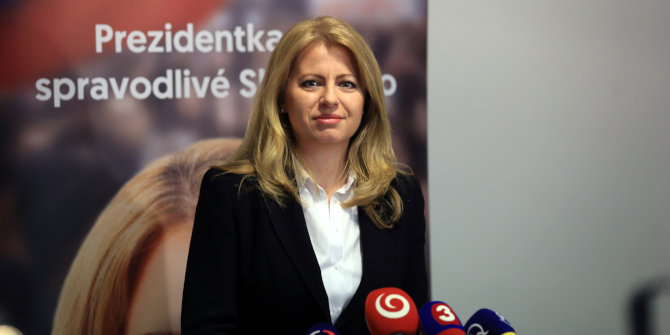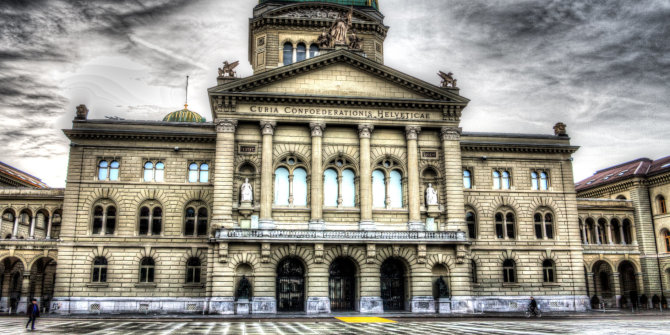 Zuzana Čaputová took office as Slovakia’s new President on 15 June. Her election victory in March, coupled with her party’s coalition topping the polls in the European elections in May, has been portrayed by many observers as a rejection of populist politics. Michael Rossi argues that this perception is misleading: voters have not delivered a blow against populism, or a victory for progressive politics, but have instead taken a stand against political cronyism and corruption.
Zuzana Čaputová took office as Slovakia’s new President on 15 June. Her election victory in March, coupled with her party’s coalition topping the polls in the European elections in May, has been portrayed by many observers as a rejection of populist politics. Michael Rossi argues that this perception is misleading: voters have not delivered a blow against populism, or a victory for progressive politics, but have instead taken a stand against political cronyism and corruption.
Given the steady entrenchment of illiberal democratic governments across Central Europe in recent years, it is not surprising the election in March of Zuzana Čaputová as Slovakia’s president was met with relief, if not outright euphoria, in most Western liberal media. The Financial Times hailed it as a veritable triumph of liberalism over populism. The New York Times and Bloomberg News reported it as a backlash against populism and a rebuke to nationalism. The Guardian praised it as a victory for progressive values, while the Washington Post claimed it as a reckoning for political strongmen, whose hold on power has an expiry date.
Such laudations may have been premature given the presidency is a largely ceremonial role; yet they were not entirely without justification. Čaputová seems to mark a clear break from the pool of officials that have dominated political life for much of the last twenty years. Identified in dozens of headlines as a liberal lawyer, she ran for office as an outsider known for working to shut down an illegal toxic waste dump owned by wealthy real-estate owners with political ties, earning her the moniker “the Erin Brokovich of Slovakia.” This appealed to an electorate largely disillusioned with current political elites; all of whom are associated in some form or another with institutionalised corruption and political clientelism.

Zuzana Čaputová, Credit: Slavomír Frešo (CC BY-SA 4.0)
Though similar symptoms exist throughout Central and Southeastern Europe, the Slovak electorate had been increasingly critical of Čaputová’s chief opponent, Maroš Šefčovič, an independent candidate with close ties to Smer-SD (Direction-Social Democracy), a centre-left party that has held power for eleven of the last thirteen years. To date, Smer-SD remains under the control of Robert Fico, one of the most powerful political actors in the country and who, in the weeks leading up to Čaputová’s run-off against Šefčovič, attacked her as representing “people without values”, playing on tropes about the liberal candidate being on George Soros’s payroll and whipping up conservative fears that traditional values and ideals are under attack by external forces financing internal contagion.
Perhaps the most important reason for Čaputová’s surge in public opinion was the shock and anger many Slovaks felt over the murder of investigative journalist Ján Kuciak and his fiancée Martina Kusnirova, last year. Kuciak had been well-known for his work digging into the ties between political officials and organised crime syndicates. Though this association has been widely regarded as one of the worst-kept secrets in Slovakia and is prevalent in other Eastern European countries, the murder of a journalist served as the tipping point.
As the main political party associated with Slovakia’s current state of democratic malaise, Smer-SD suffered a significant drop in public confidence for, at best, being unable to stem the tide of crime and corruption, or, at worst, being accomplices to it. After more than a decade serving as Slovakia’s untouchable, and largely unaccountable, prime minister, Robert Fico was forced into resignation, although he remained the Smer-SD leader.
If Čaputová’s electoral victory shows any sign that Slovakia is politically shifting, she appears most of all to be reorienting it to the liberal centre instead of anything truly “progressive” as some media outlets champion her for. First, and probably most important, her election wasn’t so much a victory against populism and nationalism as it was against the corrupt status quo. Comparatively speaking, Slovakia lacks the type of organised illiberal populism found in Hungary’s Fidesz or Poland’s Law and Justice parties. The closest Slovakia has ever had to a populist party in government was the People’s Party – Movement for a Democratic Slovakia (L’S – HZDS) throughout much of the 1990s under the political leadership of Vladimir Mečiar, but whose politics could be better compared to the quasi-authoritarianism of Slobodan Milošević or Franjo Tuđman of Serbia and Croatia respectively.
The eventual collapse of Mečiar’s authority was due to public dissatisfaction with endemic political corruption and cronyism. Like Mečiar, Robert Fico frequently engages in national-populist rhetoric and over the past decade has transformed himself and his party into veritable defenders of Slovak hearth and home. Smer-SD has tapped into the strong influence Catholicism still holds throughout Slovakia, blocked ratification of the Istanbul Convention that combats violence against women and domestic violence, and is considering banning adoptions by same-sex couples. Without any major political bloc or socio-cultural group to counter-balance against, Smer-SD has governed virtually unopposed for years. Yet even given its nationalist hues, Smer-SD cannot be compared with the clearly right-wing national populism of Orbán’s Fidesz, or Kaczyński’s Law and Justice parties, which frequently pit themselves against the perennial “corrupt elite.”
This apparent habit by international media outlets of labelling and lumping anything that hints at nationalism and conservatism in Europe as part of the latest populist craze has oversimplified politics in post-Communist Europe, where ethnonationalism has been employed in nearly all political parties and movements since the early 1990s. Even pro-EU parties like Solidarity were founded on principles that identified and defended fundamental values of cultural identity, language preservation, religious parochialism, and, even when minorities are not present or large enough to be cast as the “other”, xenophobia. Thus, to be nationalist in Central Europe doesn’t necessarily mean one is conservative or populist.
In general, Slovakian political culture remains primarily traditional and parochial, with the usual adherences to Faith, Family, and Fatherland; a pervasive set of narratives among Slovak political parties. To be sure, Slovakia has its pronounced far-right, organised in the People’s Party – Our Slovakia (L’SNS) under the leadership of Marian Kotleba. Kotleba also ran for president in this past election, and came in fourth, securing little more than 10% of the vote in the first round. Beyond this, the only other political party in Slovakia that might be regarded as populist is the Slovak National Party, which is currently in a governing coalition with Fico’s Smer-SD. However, their share of the parliamentary electoral vote was little more than 8%. If they actually voted in the second round, it is highly probable supporters of both parties voted more for Šefčovič than Čaputová.
Second, Čaputová’s victory can also be attributed to her personality, professionalism, and mild-mannered speaking in a country largely led by officials known for their elitism and patrimonialism. In this past election, Fico, who still wields considerable influence over politics and media, frequently played into the general paranoia of conservative Slovak society that a woman campaigning on greater LGBT rights and rights for women would attack the institutions of marriage and parenthood, while her platforms of greater EU-inclusiveness would open the proverbial floodgates to allow all sorts of Middle Eastern migrants to settle in Slovakia.
For his part, Čaputová’s main opponent Maroš Šefčovič, who has served in various posts within the European Commission since 2009, ran on the faith-family-fatherland platform, warning voters not to be taken in by Čaputová’s “ultraliberal agenda” that stood “in exact contradiction to traditional Christian values.” To this came a number of television ads casting himself as a wholesome family man who can’t imagine Sunday dinner without schnitzel. This was ridiculed by Slovak voters who seemed ready for something, and someone, new. Given that Šefčovič was so tightly associated with Smer-SD that many Slovaks believed a vote for him was a vote for Robert Fico, fatigue over the status quo coupled with the presence of an outsider untainted by cronyism made Čaputová the frontrunner weeks before votes were cast.
Like most of the rest of the region, living standards in Slovakia have certainly improved by way of consumerism. But the nature of politics, especially state bureaucracies, has changed very little from the Communist period. “Getting ahead” is still largely based on who one knows, rather than what one is qualified for. Political parties are defined less by a set of ideologies and more by the party leaders who control them as their own tool of power. The understanding that corruption, graft, nepotism, clientelism, and kleptocracy only seem to get worse with each successive government ousting the previous one produces a general feeling of malaise and disappointment throughout post-Communist Europe.
Thus, in a region where politics is almost always dominated by the same political elites either preserving or jockeying for power, it comes as quite a breath of fresh air when a complete outsider like Čaputová challenges politics-as-usual and doesn’t have a history of corruption and theft of their own. Still, even with all of this, Zuzana Čaputová won only 58% of the vote against Šefčovič’s 42%; a clear victory, but not the landslide Western media headlines seemed to imply. Additionally, only about 42% of Slovak citizens voted in the final round – the lowest percentage for any round of presidential elections in Slovakia since independence.
Third, the Slovak presidency is largely a ceremonial role, with most power remaining within parliament, which is still controlled by Smer-SD. While Čaputová will be able to exercise veto power over the appointment of judges, her independent affiliation makes her a lone activist among career politicians still determined to maintain the status quo and, some fear, rely on the still-powerful Fico to limit her decision-making. Two things will be critical as to whether Čaputová’s victory signals something bigger: parliamentary elections and an empowered civil society.
If Slovaks now feel that political change can happen and that Smer’s power monopoly can be challenged, then we may very well see a political shift like we did more than a decade ago with the passing of power from Mečiar to Fico. Recent developments seem to offer some guarded optimism as Progressive Slovakia, a recently established political party Čaputová joined before winning the presidency, appears to be on rise, while Smer has suffered a significant loss in public opinion following Šefčovič’s defeat. More importantly, Progressive Slovakia is working in coalition with Spolu (“Together”) to create a new liberal pro-European bloc in Slovakian politics. Both parties earned the largest percentage of votes in Slovakia during the recent European Parliamentary elections, which bodes well for them for next year’s parliamentary elections.
Still, it is premature to predict whether Čaputová’s electoral win turns a metaphoric page in Central Europe’s political book, as the region is still heavily influenced by illiberal democratic strongmen who, in the absence of any developed political Left will continue to channel public dissatisfaction with the nature, rate, and shape of democratic and economic transition into national populist anger against all things global, cosmopolitan, “European”, and “multicultural.” Progressive Slovakia and Spolu may have gained two seats each in the EP, but so did Kotleba’s L’SNS, which campaigned by showing the amount of Middle Eastern migrants living in Brussels as a forewarning of what could happen in Bratislava. Even within party ideology, Progressive Slovakia identifies closest with France’s “La République En Marche!” the party of Emmanuel Macron, which may be pro-European, but is avowedly neoliberal centrist. It is also worth remembering that Robert Fico still exerts considerable influence over Slovakian politics and culture.
It is therefore important to wait and see what Čaputová will be capable of doing as Slovakia’s next president. If she is able to tap into public dissatisfaction against the status quo, we may see the Progressive Slovakia Party grow into an alternative political movement at the local and national levels. But if she is unsuccessful in reigning in Slovakia’s entrenched political elite and endemic ethnonationalism, her election will be little more than a protest vote easily reversed, come next election season.
Please read our comments policy before commenting.
Note: This article gives the views of the author, not the position of EUROPP – European Politics and Policy or the London School of Economics.
_________________________________
 Michael Rossi – Rutgers University
Michael Rossi – Rutgers University
Michael Rossi is a University Instructor in the Department of Political Science at Rutgers University, and was recently a Visiting Instructor in the Department of Political Science at Long Island University Brooklyn.





2 Comments